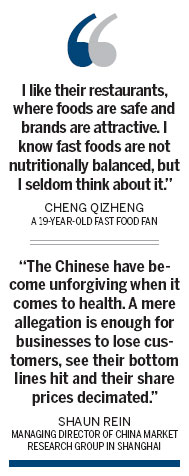Cover Story
Some foreign fast food is harder to swallow
Updated: 2011-08-15 08:14
By Zhang Yuchen (China Daily)
|
![Ajisen Ramen's popular noodle soup meets the Japanese brand's standards, but not those of many customers, who believed the broth was made from scratch at each restaurant in the chain. [Zhang Tao / China Daily] Some foreign fast food is harder to swallow](../../attachement/jpg/site1/20110815/0013729e48090fb2a6800a.jpg) |
|
Ajisen Ramen's popular noodle soup meets the Japanese brand's standards, but not those of many customers, who believed the broth was made from scratch at each restaurant in the chain. [Zhang Tao / China Daily] |
A sensitive public
The soy milk, ramen soup and burger buns are able to prompt such reactions because the Chinese have high expectations for the quality of foreign fast foods.
"Part of the reason Western brands are so successful is that people trust they won't cut corners like so many domestic brands do," said Shaun Rein, managing director of China Market Research Group in Shanghai.
Cheng, the fast food fan, agreed. Speaking of KFC and McDonald's, he said: "I like their restaurants, where foods are safe and brands are attractive. I know fast foods are not nutritionally balanced, but I seldom think about it."
 |
Chinese people do think about food safety, however, especially following scandals such as the tainting of milk and powdered baby formula in 2008 with the toxic chemical melamine. Even a tiny suspicion may cause serious doubts, marketing experts say.
Food and product safety was the biggest concern for Chinese consumers, ahead of paying for medical bills or children's education, according to a survey of 5,000 consumers in 15 cities by Rein's group last year. Those concerns continue to be high on the agenda because of regular allegations that food companies and restaurants are using poor-quality ingredients, Rein said.
"The Chinese have become unforgiving when it comes to health. A mere allegation is enough for businesses to lose customers, see their bottom lines hit and their share prices decimated," he said.
In the case of Ajisen Ramen, the company suffered great loss in image and credibility because the much-advertised soup is its major selling point, said Xia Xiang, lawyer from Chai and Fu's Law Firm in Beijing.
Regulating claims
China's regulations on advertisements are too lenient when it comes to misrepresentation, lawyers say, and the low penalty is a reason that many businesses take the risk.
If the administration of commerce and industry finds that a company misled consumers in its advertising, a penalty of 30,000 to 100,000 yuan ($4,700 to $15,600) can be assessed - a small amount for a large business, Xia said. Lawsuits often meet difficulty in evidence collection. Among 29 recent cases claiming misleading ads that were filed in Beijing's Fengtai district court, 19 lost because of the lack of solid proof and the high cost of legal battles.
Government supervision of fast foods is also insufficient, lawyer Qiu said. "The government should be able to supervise the whole chain of the fast food supply, but there is not a uniform set of standards and regulations. Lines between the functions of the involved administrative departments are blurred."

Specials

Jewel of the south
Zhuhai in South China has a wealth of natural allure that is open for business.

China in vogue
How Country captured the fascination of the world's most powerful fashion player

More than just a game
Mahjong is a deep-rooted cultural tradition that touches every level of society